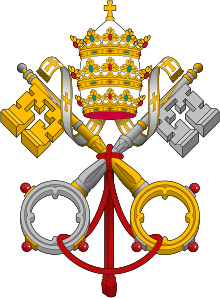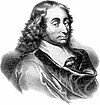Portal:Catholic Church
Introduction The Catholic Church, also known as the Roman Catholic Church, is the largest Christian church, with 1.39 billion baptized Catholics worldwide as of 2022. It is among the world's oldest and largest international institutions, and has played a prominent role in the history and development of Western civilization. The church consists of 24 sui iuris churches, including the Latin Church and 23 Eastern Catholic Churches, which comprise almost 3,500 dioceses and eparchies located around the world. The pope, who is the bishop of Rome, is the chief pastor of the church. The Diocese of Rome, known as the Holy See, is the central governing authority of the church. The administrative body of the Holy See, the Roman Curia, has its principal offices in Vatican City, a small independent city-state and enclave within the Italian capital city of Rome, of which the pope is head of state. The core beliefs of Catholicism are found in the Nicene Creed. The Catholic Church teaches that it is the one, holy, catholic and apostolic church founded by Jesus Christ in his Great Commission, that its bishops are the successors of Christ's apostles, and that the pope is the successor to Saint Peter, upon whom primacy was conferred by Jesus Christ. It maintains that it practises the original Christian faith taught by the apostles, preserving the faith infallibly through scripture and sacred tradition as authentically interpreted through the magisterium of the church. The Roman Rite and others of the Latin Church, the Eastern Catholic liturgies, and institutes such as mendicant orders, enclosed monastic orders and third orders reflect a variety of theological and spiritual emphases in the church. Of its seven sacraments, the Eucharist is the principal one, celebrated liturgically in the Mass. The church teaches that through consecration by a priest, the sacrificial bread and wine become the body and blood of Christ. The Virgin Mary is venerated as the Perpetual Virgin, Mother of God, and Queen of Heaven; she is honoured in dogmas and devotions. Catholic social teaching emphasizes voluntary support for the sick, the poor, and the afflicted through the corporal and spiritual works of mercy. The Catholic Church operates tens of thousands of Catholic schools, universities and colleges, hospitals, and orphanages around the world, and is the largest non-government provider of education and health care in the world. Among its other social services are numerous charitable and humanitarian organizations. (Full article...) Selected article
 Mangalorean Catholics are Roman Catholics from the former South Canara district on the southwestern coast of India. They are Konkani people and speak the Konkani language. Portuguese shipping arrived in Mangalore in 1526, and Catholic missionary activities began around 1534, when Canara was placed under the ecclesiastic jurisdiction of the Bishop of Goa. Most of the ancestors of Mangalorean Catholics were Goan Catholics, who had migrated to South Canara from Goa, a state north of Canara, between 1560 and 1763 during the Goa Inquisition and the Portuguese-Maratha wars. Gradually they learned the languages of South Canara but retained Konkani as their mother tongue. In time, they referred to themselves as Mangalorean Catholics to distinguish themselves from their ancestors from Goa. The most disconsolate memory in the community's history was a 15-year captivity imposed by Tipu Sultan, the de facto ruler of Mysore, from 24 February 1784 to 4 May 1799 at Seringapatam. After the defeat of Tipu Sultan, the community resettled in South Canara, and gradually prospered under the British. The culture of Mangalorean Catholics is a blend of Canarese and Goan cultures. After migration, they adopted the local Canarese culture but retained many of their Goan customs and traditions. The Mangalorean Catholic diaspora is scattered across the globe, with emigrant communities in the Arab states of the Persian Gulf and the English-speaking world.
Selected image
 Credit: LivioAndronico The Trevi Fountain is the largest — standing 25.9 meters (85 feet) high and 19.8 meters (65 feet) wide — and most ambitious of the Baroque fountains of Rome. Competitions had become the rage during the Baroque era to design buildings, fountains, and even the Spanish Steps. In 1730 Pope Clement XII organized a contest in which Nicola Salvi initially lost to Alessandro Galilei — but due to the outcry in Rome over the fact that a Florentine won, Salvi was awarded the commission anyway. Work began in 1732, and the fountain was completed in 1762, long after Clement's death, when Pietro Bracci's 'Neptune' was set in the central niche. Selected biography
 Blaise Pascal (French pronunciation: [blɛz paskal]), (June 19, 1623 – August 19, 1662) was a French mathematician, physicist, and religious philosopher. He was a child prodigy who was educated by his father. Pascal's earliest work was in the natural and applied sciences where he made important contributions to the construction of mechanical calculators, the study of fluids, and clarified the concepts of pressure and vacuum by generalizing the work of Evangelista Torricelli. Pascal also wrote in defense of the scientific method. Pascal was a mathematician of the first order. He helped create two major new areas of research. He wrote a significant treatise on the subject of projective geometry at the age of sixteen, and later corresponded with Pierre de Fermat on probability theory, strongly influencing the development of modern economics and social science. Following a mystical experience in late 1654, he abandoned his scientific work and devoted himself to philosophy and theology. His two most famous works date from this period: the Lettres provinciales and the Pensées. Pascal suffered from ill health throughout his life and died two months after his 39th birthday.
Did you know...
Related portalsFeast Day of May 30
Selected quote

News
SubcategoriesTopics
The Holy Bible:
Particular Churches (grouped by liturgical rite):
Things you can do
External resourcesWikiProjectsAssociated WikimediaThe following Wikimedia Foundation sister projects provide more on this subject:
Discover Wikipedia using portals |


































